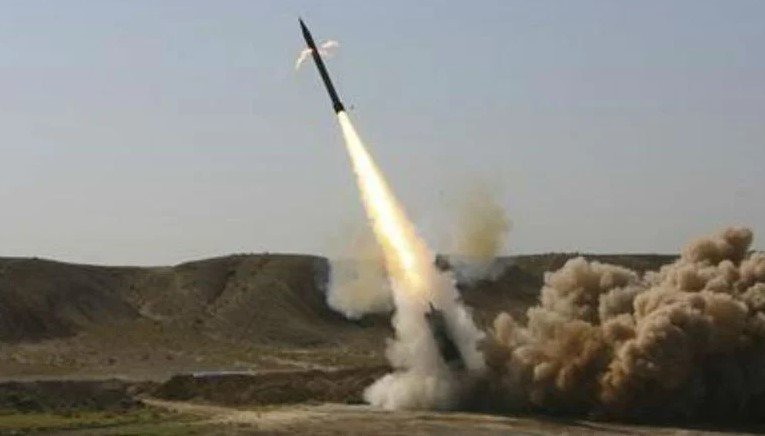A missile fired from Yemen has triggered air raid sirens in northern Israeli-occupied territories, escalating tensions in a volatile region. The missile strike came amid Yemen’s ongoing military operations in support of Palestinians, particularly against Israeli actions in Gaza. The Israeli military responded swiftly, claiming its defense systems intercepted the incoming projectile, but not before the sirens caused widespread alarm.
The missile struck areas including Haifa, Kiryat Ata, and the Western Galilee early Wednesday morning, prompting emergency services into action. While no immediate casualties were reported from the attack itself, Israel’s Magen David Adom emergency services confirmed that several individuals were injured while scrambling for cover. The attack represents a sharp escalation in Yemen’s ongoing support for Palestinian forces.
Yemen’s Military Readiness and the Regional Impact
Yemen’s recent missile launches are just one part of a broader military strategy, as the country’s Armed Forces have stepped up their readiness. In recent days, Yemen has shown a clear willingness to retaliate, striking both Israeli and U.S. military assets in the region. The missile strike on Israeli-occupied territories was launched shortly after a wave of airstrikes by U.S. forces targeted multiple regions in Yemen, including strategic locations like the Majzar district in Ma’rib and Hudaydah in the west.
In retaliation to these airstrikes, Yemen has made its presence felt with a series of missile launches targeting key Israeli and U.S. interests. These include assets in the Red Sea and coastal territories around Yemen’s borders. The latest missile attack is indicative of the deepening involvement of Yemen in the ongoing geopolitical conflict surrounding Israel and Palestine.

The missile launch that triggered sirens in Israel’s northern regions was launched as a direct response to the ongoing Israeli airstrikes in Gaza, according to sources within Yemen’s military command. The missile’s trajectory indicated an intentional targeting of areas with significant Israeli presence, sending a clear message to both Israel and its allies.
Strategic Significance of the Missile Strike
The recent missile attack not only highlights the continued conflict between Israel and Yemen but also underscores the shifting dynamics in the Middle East. Yemen’s military forces, bolstered by a growing readiness to challenge regional powers, have increasingly targeted high-value military assets in retaliation to foreign aggression. The missile strike that rattled Israeli cities is part of this broader strategy to assert Yemeni strength and influence in the region.
Israel’s Iron Dome defense system, which is widely regarded as one of the most advanced in the world, likely played a role in intercepting the missile. However, the attack still triggered widespread panic and underscored the vulnerability of the occupied territories. The fact that the sirens went off in multiple locations, including Haifa and Kiryat Ata, reveals just how far-reaching the impacts of such missile strikes can be.
This missile strike was one of the first of its kind to directly target northern Israeli regions. Though Yemen has traditionally targeted military sites and naval interests in the Red Sea, this escalation into Israeli-occupied territory represents a new phase in the ongoing conflict.
Yemen’s Strikes: A Reprisal Against U.S. Aggression
The Yemeni missile launches are also seen as retaliatory actions against U.S. military operations in Yemen. In the days leading up to the missile strike on Israeli territories, the U.S. conducted several airstrikes across Yemen, including on the Majzar district and the strategically important Kamaran Island. These operations, which have raised tensions between Yemen and the U.S., are part of Washington’s broader Middle Eastern strategy.
The missile strike on Israel comes on the heels of U.S. aggression against Yemen’s military sites. Yemen has made it clear that such operations will not go unchallenged. In addition to strikes on U.S. assets, Yemen has vowed to take action against any country seen as supporting Israel’s military campaign in Gaza.
Reports from Yemen’s official Saba news agency confirm that the airstrikes on Israeli territories were followed by retaliatory missile fire on U.S. military assets, including the American presence in the Red Sea and around the Horn of Africa. This back-and-forth exchange is likely to continue as both sides prepare for further escalations in the coming days.
Regional Fallout: Widespread Tensions and Growing Fears of Escalation
While Yemen’s missile attack on Israeli-occupied territories has caused alarm, it also marks a significant moment in the Middle East’s ongoing security dynamics. The series of military exchanges between Yemen, the U.S., and Israel reflect the increasingly volatile nature of the region. Yemen’s missile launches come amid escalating violence between Israel and Palestinian factions in Gaza, with no sign of de-escalation on the horizon.
For Israel, the risk of further missile strikes could have serious implications for security in the region. The Iron Dome defense system, though effective in intercepting many threats, has its limits. As more missiles are fired from Yemen, the possibility of a major regional conflict grows increasingly likely.
At the same time, Yemen’s military actions are not limited to missiles alone. The ongoing airstrikes on U.S. military positions serve as a reminder of Yemen’s growing resolve to challenge foreign interventions in the region, particularly those linked to the Israeli-Palestinian conflict.
What Comes Next for Yemen and Israel?
As the missile strikes continue, both Yemen and Israel will likely face pressure from international actors to de-escalate the situation. However, with both sides preparing for further military operations, the risk of a broader regional conflict looms large.
For now, the situation remains fluid, with Yemen vowing to continue its missile launches in support of Palestinian efforts against Israeli forces. The missile attack on northern Israeli cities is just the latest chapter in the ongoing tensions between these countries, and it seems that neither side is ready to back down.
